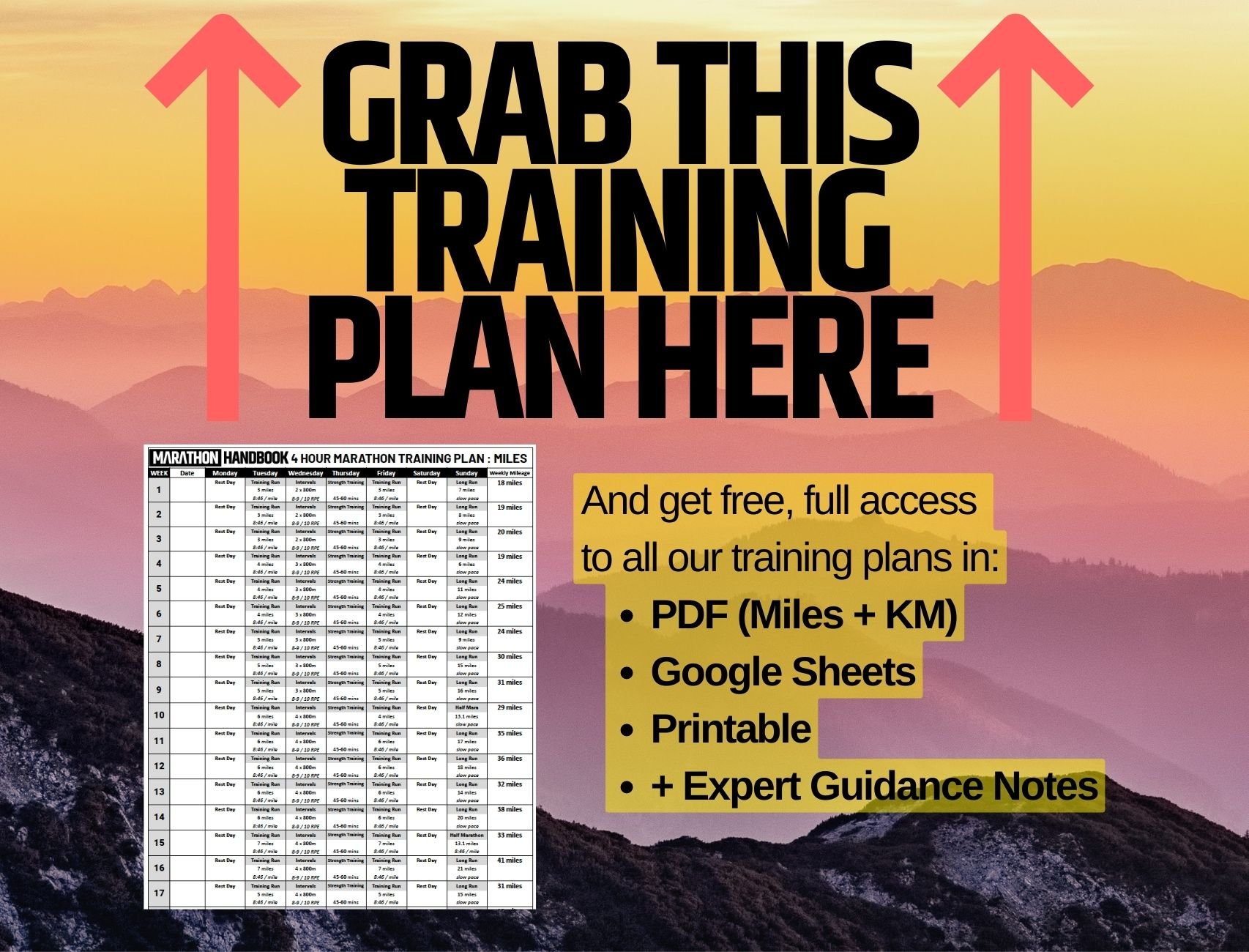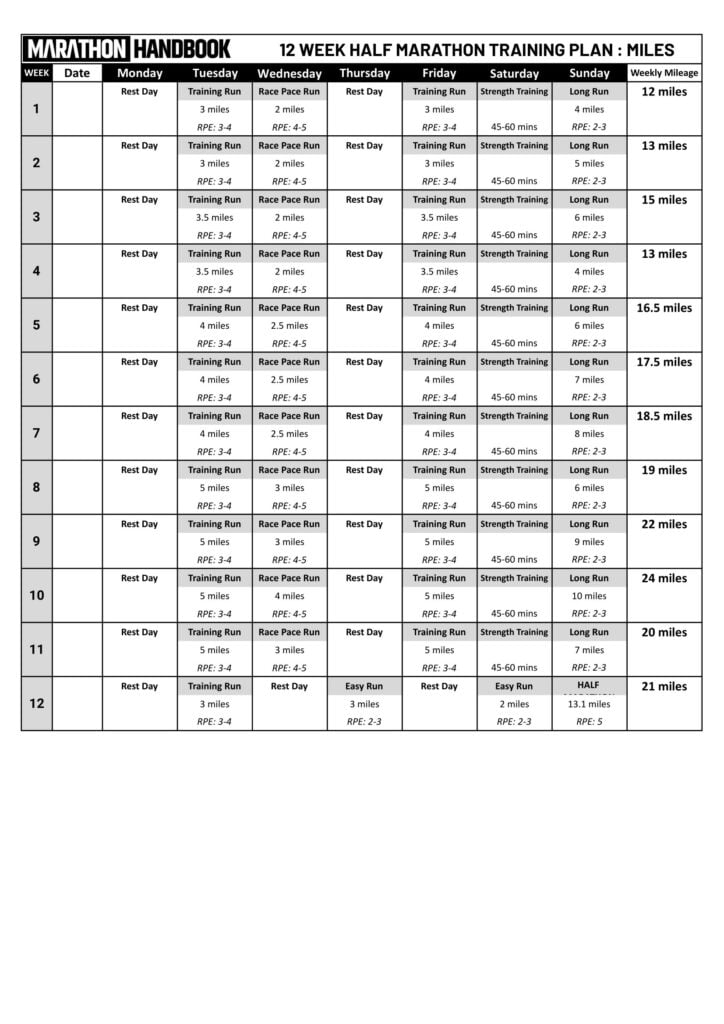Our 12 Week Half Marathon Training Plan is our most popular training plan for the half marathon event!
This 12-week half marathon training plan with PDF included is designed to get you to the finish line comfortably while building your training in a structured way to minimize the risk of injury or burnout.
12 weeks give ample time for beginner and intermediate runners to get ready for their half marathon. Therefore, we’ve built this training program with a focus on building your endurance first, without too much concern about speed.
If you have more time to prepare, check out our 16-week half-marathon training plan designed with beginners in mind. We’ve also got a host of training plans structured around time-based goals (like running a sub-2-hour half marathon).
Ready to start your training?
Let’s jump in!
Can You Train For a Half Marathon In 12 Weeks?
Absolutely.
As long as you have some running ability, it’s entirely possible to get ready to cover 13.1 miles in 12 weeks.
12 weeks is about right for most people; it’s enough time to allow you to gradually increase your mileage without overdoing it.
It’s also not too long a training period that you get fatigued or overtrain – it’s right in the sweet spot.
Our 12-week half marathon training schedule also includes a 2-week half marathon taper: in other words, you do your longest training run 2 weeks before your actual event, then wind down your training somewhat over those final two weeks, so you’re rested and ready when you line up at the start line!

12-Week Half Marathon Training Plan: Essential Info
Who Is It For?:
This plan is for beginners and intermediate runners preparing for their first half marathon.
You should ideally be able to run 3 miles (or 5km) without stopping before committing to the plan.
(If this seems like a lot, you can adopt a run/walk approach in your training and race.)
If you’re looking for a great plan to get you through your first half marathon, then this is it!
How Long?:
12 weeks // 3 months.
How Many Days Per Week?:
The plan includes 4 runs a week, consisting of three different types of running.

Training Breakdown – What Will Your Weekly Training Consist Of?
The schedule will consist of 4 runs per week, 1 day of cross training, and two days of rest.
The plan is designed to cover the required mileage and hours on your feet to get you ready for your half marathon!
2 Regular Training Runs
All of the regular runs should be done at a comfortable, sustainable, conversational pace; don’t worry about your pace or finishing time if this is your first half-marathon effort.
1 Tempo Run (or another regular training run, if you prefer)
For the Wednesday Tempo Run, you can choose whether you want to increase the pace a little and target a specific race pace, or simply hang back and stick to your comfortable conversational pace.
1 Long Run At The Weekends
Long runs on Sundays are there to increase your maximum mileage and time on your feet. The whole purpose of these is to run slowly – at a conversational pace – no faster.
If you are struggling during these long runs, feel free to take walking breaks, no worries. The important thing is to cover the mileage necessary.
Cross Training And Rest Days
The plan includes one day of cross-training and two rest days. The rest days are especially important for letting your body recover.
Feel free to download the plan and change it up to suit your schedule!
Download The 12-Week Half Marathon Training Plan for Free In PDF, Printable, Or Google Sheets Format:

Download The Training Plan Here
Enter your email, and I’ll send you this free training plan now, in PDF and Google Sheets formats (completely customizable), in both miles and kilometers.
After entering your email, you’ll be prompted to create an account on the Grow platform we use to control access to the plans. It’s completely free – make sure to complete the process to gain access to the plan!
Previous visitor or not seeing where to sign up?
Head over to our half marathon training plan database for full access to all plans.

Check Out The Premium Version of The 12 Week Half Marathon Training Plan . . .
We’ve teamed with TrainingPeaks to offer a premium version of the 12 Week Half Marathon Training Plan:
Access the plan via the TrainingPeaks website and app, track your workouts in real-time against the plan, and get performance data analysis on your progress.
Check out the premium 12 Week half marathon training plan here!
4 Tips For Acing Your 12-Week Half Marathon Training

1. Don’t Get Hung Up On Speed
Sure, everyone likes to humblebrag about their HM finishing times, or their comfortable running speed.
But when it comes to attempting a half marathon – especially if it’s your first – it’s wise to forget all about speed, at least as much as possible.
Why?
Trying to improve your running speed takes a lot of work, and specific workouts like Interval Training and HIIT-style sprint sessions. These can be a lot of fun, but also take their toll on your body.
When you combine them in with the long runs and increasing mileage of our 12 week half marathon training plan, you’re placing a lot of stress on your body. You’re not only trying to build endurance, but speed at the same time. And you’re massively increasing the risk of suffering from an injury, or burn-out, or exhaustion.
So my main advice for beginner half marathon runners is to choose a pace that you are comfortable and confident with. If that means it’s a relaxing jog, then so be it. It’s better to get to the finish line of your half marathon than burn out during training and not even start.
When you’re ready, you can check out our Half Marathon Pace Calculator to help plan your race speed based on your finish time goal.
2. Prioritise The Long Run

Some people love their weekly long run.
Others get restless and uncomfortable when trying to keep running for so long.
Whether you love it or hate it, you should prioritise your weekly long run.
In fact, it’s the most important run of your entire week.
The long run is the workout which really builds your endurance. It teaches your muscles to keep going for longer and longer, it trains your cardiovascular system to keep delivering oxygen efficiently to your muscles, and tells your body that it needs to get good at fuelling for longer periods.
For the 12 week half marathon training plan, remember that it’s not necessary to run your entire long run. Feel free to take walking breaks, or even adopt a structured run/walk approach to your training.
But if you need a break from your training and want to skip a workout, try not to skip the long run.
3. Know When To Take a Break
Downtime is essential for runners.
Putting aside time to focus on rest and recuperation allows your body to relax, heal, and re-build – so it will be ready and stronger for the next workout.
The 12 week half marathon training plan includes 2 rest days a week, but remember that the plan should be flexible and based around your life; not the other way around.
So if you get to Friday and are totally burned out by a heavy week – whether in training, work life, or at home – never feel bad about granting yourself an additional rest day.
Perhaps the most important thing to do when training for a half marathon is to listen to what your body is telling you – if you find that training is getting harder and takes more and more effort, it’s probably a sign you need a break.
4. Strength Training Is Your Secret Weapon

The 12 week half marathon schedule includes one day of cross training per week. While cross training can include any activity which complements your run training, I highly recommend doing a simple strength training workout.
Cross training improves your cardiovascular health and strengthens some of the muscles weakened through running
Strength training, especially when focussed on the upper legs, core, and back, can have a huge impact on your running abilities.
Not only does it make you less injury-prone (those exercises tend to address muscular imbalances), it also makes you a more economical runner. In other words, you get more miles per gallon out of your legs, so you’ll find you can go a little faster.
Read our 6 Essential Bodyweight Exercises for Runners
Check Out Our 20 Minute Bodyweight Workout For Runners (No Equipment Needed)
Other Suggested Half Marathon Training Plans:
Beginner + Novice Training Plans
- Couch To Half Marathon Training Plan
- 5k To Half Marathon Training Plan
- Beginner 16 Week Half Marathon Training Plan
- 15 Week Beginner Half Marathon Training Plan
Intermediate + Advanced Half Marathon Training Plans
- 10k To Half Marathon Training Plan
- 10 Week Improver Half Marathon Training Plan
- 8 Week Half Marathon Training Plan
- 6 Week Half Marathon Training Plan
- 4 Week Half Marathon Training Plan
Time-based Half Marathon Training Plans
- Sub 2-Hour Half Marathon Training Plan
- 1:45 Half Marathon Training Plan
- 1:30 Half Marathon Training Plan – 12 Weeks
- 1:30 Half Marathon Training Plan – 8 Weeks
Check out the Half Marathon Training Plans page for more.


Proven Training Plans by a UESCA-Certified Running Coach
Every one of our training plans has been developed by Thomas Watson, a UESCA-certified running coach.
Thomas is also a podium-finishing ultra-marathon runner and has dozens of marathons under his belt.
Each training plan has been road-tested by hundreds of runners, refined and improved, and is free to download and customize to suit your needs!



